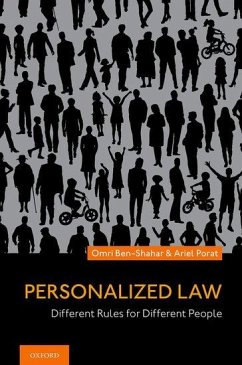Omri Ben-Shahar (Leo Herzel Professor Leo Herzel Professor of Law, Ariel Porat (Alain Poher Professor of Law & Alain Poher President
Personalized Law
Different Rules for Different People
Omri Ben-Shahar (Leo Herzel Professor Leo Herzel Professor of Law, Ariel Porat (Alain Poher Professor of Law & Alain Poher President
Personalized Law
Different Rules for Different People
- Gebundenes Buch
- Merkliste
- Auf die Merkliste
- Bewerten Bewerten
- Teilen
- Produkt teilen
- Produkterinnerung
- Produkterinnerung
We live in a world of one-size-fits-all law. People are different, but the laws that govern them are uniform.
Andere Kunden interessierten sich auch für
![International Court Authority International Court Authority]() Mikael Rask Madsen (EURECO Professor of European Law and IntegratioInternational Court Authority67,99 €
Mikael Rask Madsen (EURECO Professor of European Law and IntegratioInternational Court Authority67,99 €![The Power of Our Supreme Court The Power of Our Supreme Court]() Matt BeatThe Power of Our Supreme Court18,99 €
Matt BeatThe Power of Our Supreme Court18,99 €![The Jury The Jury]() Renee Lettow Lerner (Donald Phillip Rothschild Research Professor oThe Jury17,99 €
Renee Lettow Lerner (Donald Phillip Rothschild Research Professor oThe Jury17,99 €![From Jim Crow to Civil Rights From Jim Crow to Civil Rights]() KlarmanFrom Jim Crow to Civil Rights38,99 €
KlarmanFrom Jim Crow to Civil Rights38,99 €![Introduction to English Legal History Introduction to English Legal History]() John Baker (Professor of the Laws Professor of the Laws of EnglandIntroduction to English Legal History99,99 €
John Baker (Professor of the Laws Professor of the Laws of EnglandIntroduction to English Legal History99,99 €![The Practical Guide to Mooting The Practical Guide to Mooting]() Jeffrey Hill (Chinese University of Hong Kong)The Practical Guide to Mooting39,99 €
Jeffrey Hill (Chinese University of Hong Kong)The Practical Guide to Mooting39,99 €![The Handy Supreme Court Answer Book The Handy Supreme Court Answer Book]() Hudson, David L., J.D.The Handy Supreme Court Answer Book27,99 €
Hudson, David L., J.D.The Handy Supreme Court Answer Book27,99 €-
-
-
We live in a world of one-size-fits-all law. People are different, but the laws that govern them are uniform.
Hinweis: Dieser Artikel kann nur an eine deutsche Lieferadresse ausgeliefert werden.
Hinweis: Dieser Artikel kann nur an eine deutsche Lieferadresse ausgeliefert werden.
Produktdetails
- Produktdetails
- Verlag: Oxford University Press Inc
- Seitenzahl: 256
- Erscheinungstermin: 31. Mai 2021
- Englisch
- Abmessung: 240mm x 160mm x 28mm
- Gewicht: 504g
- ISBN-13: 9780197522813
- ISBN-10: 0197522815
- Artikelnr.: 61267360
- Herstellerkennzeichnung
- Libri GmbH
- Europaallee 1
- 36244 Bad Hersfeld
- gpsr@libri.de
- Verlag: Oxford University Press Inc
- Seitenzahl: 256
- Erscheinungstermin: 31. Mai 2021
- Englisch
- Abmessung: 240mm x 160mm x 28mm
- Gewicht: 504g
- ISBN-13: 9780197522813
- ISBN-10: 0197522815
- Artikelnr.: 61267360
- Herstellerkennzeichnung
- Libri GmbH
- Europaallee 1
- 36244 Bad Hersfeld
- gpsr@libri.de
Omri Ben-Shahar is the Leo and Eileen Herzel Professor of Law at the University of Chicago Law School, and the Kearny Director of the Coase-Sandor Institute for Law and Economics. He writes and teaches in the areas of contract law, consumer law, insurance law, trademark law, food law, and law-and-economics. Ben-Shahar is the co-author of More Than You Wanted To Know: The Failure of Mandated Disclosure (with Carl Schneider, Princeton Press 2014). Ben-Shahar is currently serving as a Reporter for the American Law Institute's Restatement of the Law, Consumer Contracts. Ariel Porat is the Alain Poher Professor of Law, and the President of Tel Aviv University. He is a member of the Israel Academy of Sciences and the EMET Prize Laureate (2014). He teaches and writes in the areas of tort law, contract law, and remedies. Porat is the co-author of Getting Incentives Right - Improving Torts, Contracts, and Restitution (with Robert Cooter, Princeton Press, 2014) and Tort Liability under Uncertainty (with Alex Stein, Oxford University Press, 2001). In the years 2003-19, Porat was a Fischel-Neil Distinguished Visiting Professor at the University of Chicago Law School. He was also a visiting professor at the universities of Columbia, Stanford, NYU, Berkeley, Virginia, and Toronto.
* Preface * CHAPTER 1: Introduction * PART I: INTRODUCING PERSONALIZED LAW * CHAPTER 2: What is Personalized Law *
Contextualization: The Old Precision Law *
Personalization: The New Precision Law *
Personalized Rules Everywhere *
Self Personalization *
Personalization and the Objectives of the Law *
Conclusion * CHAPTER 3: The Precision Benefit *
Personalized Everything *
The Benefits of Personalization *
The Benefits of Personalized Law *
The Production Cost of Precision *
Conclusion * PART II: PERSONALIZED LAW IN ACTION * CHAPTER 4: Personalized Legal Areas *
Tort Law "The Reasonable You" *
Risked
based Personalized Standards *
Skill
based Personalized Standards *
Are Personalized Standards of Care Just? *
Consumer Protection Law *
Two Dimensions of Personalization: Value and Price *
The Potential Pitfalls of Personalized Consumer Protection *
Criminal Law *
Benefit
Based Personalization *
Detection
Based Personalization * CHAPTER 5: Personalized Regulatory Techniques *
Personalized Default Rules *
Personalized Mandated Disclosures *
Personalized Compensation *
Personalized Bundles of Rights and Duties * CHAPTER 6: Personalizing Rules by Age *
Age as Input into Legal Command *
Age as Output of the Legal Command *
Trouble with Using Age as Input * PART III: PERSONALIZED LAW and EQUALITY * CHAPTER 7: Personalization and Distributive Justice *
Personalized Rules and Relevant Criteria *
Conflicts Between Distributive Justice Goals and Other Goals *
Using Personalized Law to Advance Distributive Justice Goals *
Personalized Law and Discrimination *
Suspect Classification *
Data Echoing Historical Biases *
Fixing Uniform Laws' Unequal Impact * CHAPTER 8: Personalized Law and Equal Protection *
The Constitutionality of Statistics *
Individualized Treatment *
Narrowly Tailored *
The Arguments for Differential Treatment *
Disparate Impact * PART IV: IMPLEMENTATION OF PERSONALIZED LAW * CHAPTER 9: Coordination *
Coordination of Group Activity *
Coordination of Individual Acts *
Coordination and Information *
Coordination as Participation * CHAPTER 10: Manipulation *
Distorted Investment in Human Capital *
Pretending *
Arbitrage *
Ways to Restrain Manipulation *
Immutable Characteristics *
Hypothetical Characteristics *
The Numerosity of Characteristics and Commands *
Preventing Arbitrage * CHAPTER 11: Governing Through Data *
Information is Required for Lawmaking *
Where Will the Information Come From? *
Obeying Personalized Commands *
Privacy and Data Protection *
People's Interest in Privacy *
Society's Interest in Data Protection * CHAPTER 12: Legal Robotics *
Law and Artificial Intelligence *
The Human Design *
Tomorrow Morning
Contextualization: The Old Precision Law *
Personalization: The New Precision Law *
Personalized Rules Everywhere *
Self Personalization *
Personalization and the Objectives of the Law *
Conclusion * CHAPTER 3: The Precision Benefit *
Personalized Everything *
The Benefits of Personalization *
The Benefits of Personalized Law *
The Production Cost of Precision *
Conclusion * PART II: PERSONALIZED LAW IN ACTION * CHAPTER 4: Personalized Legal Areas *
Tort Law "The Reasonable You" *
Risked
based Personalized Standards *
Skill
based Personalized Standards *
Are Personalized Standards of Care Just? *
Consumer Protection Law *
Two Dimensions of Personalization: Value and Price *
The Potential Pitfalls of Personalized Consumer Protection *
Criminal Law *
Benefit
Based Personalization *
Detection
Based Personalization * CHAPTER 5: Personalized Regulatory Techniques *
Personalized Default Rules *
Personalized Mandated Disclosures *
Personalized Compensation *
Personalized Bundles of Rights and Duties * CHAPTER 6: Personalizing Rules by Age *
Age as Input into Legal Command *
Age as Output of the Legal Command *
Trouble with Using Age as Input * PART III: PERSONALIZED LAW and EQUALITY * CHAPTER 7: Personalization and Distributive Justice *
Personalized Rules and Relevant Criteria *
Conflicts Between Distributive Justice Goals and Other Goals *
Using Personalized Law to Advance Distributive Justice Goals *
Personalized Law and Discrimination *
Suspect Classification *
Data Echoing Historical Biases *
Fixing Uniform Laws' Unequal Impact * CHAPTER 8: Personalized Law and Equal Protection *
The Constitutionality of Statistics *
Individualized Treatment *
Narrowly Tailored *
The Arguments for Differential Treatment *
Disparate Impact * PART IV: IMPLEMENTATION OF PERSONALIZED LAW * CHAPTER 9: Coordination *
Coordination of Group Activity *
Coordination of Individual Acts *
Coordination and Information *
Coordination as Participation * CHAPTER 10: Manipulation *
Distorted Investment in Human Capital *
Pretending *
Arbitrage *
Ways to Restrain Manipulation *
Immutable Characteristics *
Hypothetical Characteristics *
The Numerosity of Characteristics and Commands *
Preventing Arbitrage * CHAPTER 11: Governing Through Data *
Information is Required for Lawmaking *
Where Will the Information Come From? *
Obeying Personalized Commands *
Privacy and Data Protection *
People's Interest in Privacy *
Society's Interest in Data Protection * CHAPTER 12: Legal Robotics *
Law and Artificial Intelligence *
The Human Design *
Tomorrow Morning
* Preface * CHAPTER 1: Introduction * PART I: INTRODUCING PERSONALIZED LAW * CHAPTER 2: What is Personalized Law *
Contextualization: The Old Precision Law *
Personalization: The New Precision Law *
Personalized Rules Everywhere *
Self Personalization *
Personalization and the Objectives of the Law *
Conclusion * CHAPTER 3: The Precision Benefit *
Personalized Everything *
The Benefits of Personalization *
The Benefits of Personalized Law *
The Production Cost of Precision *
Conclusion * PART II: PERSONALIZED LAW IN ACTION * CHAPTER 4: Personalized Legal Areas *
Tort Law "The Reasonable You" *
Risked
based Personalized Standards *
Skill
based Personalized Standards *
Are Personalized Standards of Care Just? *
Consumer Protection Law *
Two Dimensions of Personalization: Value and Price *
The Potential Pitfalls of Personalized Consumer Protection *
Criminal Law *
Benefit
Based Personalization *
Detection
Based Personalization * CHAPTER 5: Personalized Regulatory Techniques *
Personalized Default Rules *
Personalized Mandated Disclosures *
Personalized Compensation *
Personalized Bundles of Rights and Duties * CHAPTER 6: Personalizing Rules by Age *
Age as Input into Legal Command *
Age as Output of the Legal Command *
Trouble with Using Age as Input * PART III: PERSONALIZED LAW and EQUALITY * CHAPTER 7: Personalization and Distributive Justice *
Personalized Rules and Relevant Criteria *
Conflicts Between Distributive Justice Goals and Other Goals *
Using Personalized Law to Advance Distributive Justice Goals *
Personalized Law and Discrimination *
Suspect Classification *
Data Echoing Historical Biases *
Fixing Uniform Laws' Unequal Impact * CHAPTER 8: Personalized Law and Equal Protection *
The Constitutionality of Statistics *
Individualized Treatment *
Narrowly Tailored *
The Arguments for Differential Treatment *
Disparate Impact * PART IV: IMPLEMENTATION OF PERSONALIZED LAW * CHAPTER 9: Coordination *
Coordination of Group Activity *
Coordination of Individual Acts *
Coordination and Information *
Coordination as Participation * CHAPTER 10: Manipulation *
Distorted Investment in Human Capital *
Pretending *
Arbitrage *
Ways to Restrain Manipulation *
Immutable Characteristics *
Hypothetical Characteristics *
The Numerosity of Characteristics and Commands *
Preventing Arbitrage * CHAPTER 11: Governing Through Data *
Information is Required for Lawmaking *
Where Will the Information Come From? *
Obeying Personalized Commands *
Privacy and Data Protection *
People's Interest in Privacy *
Society's Interest in Data Protection * CHAPTER 12: Legal Robotics *
Law and Artificial Intelligence *
The Human Design *
Tomorrow Morning
Contextualization: The Old Precision Law *
Personalization: The New Precision Law *
Personalized Rules Everywhere *
Self Personalization *
Personalization and the Objectives of the Law *
Conclusion * CHAPTER 3: The Precision Benefit *
Personalized Everything *
The Benefits of Personalization *
The Benefits of Personalized Law *
The Production Cost of Precision *
Conclusion * PART II: PERSONALIZED LAW IN ACTION * CHAPTER 4: Personalized Legal Areas *
Tort Law "The Reasonable You" *
Risked
based Personalized Standards *
Skill
based Personalized Standards *
Are Personalized Standards of Care Just? *
Consumer Protection Law *
Two Dimensions of Personalization: Value and Price *
The Potential Pitfalls of Personalized Consumer Protection *
Criminal Law *
Benefit
Based Personalization *
Detection
Based Personalization * CHAPTER 5: Personalized Regulatory Techniques *
Personalized Default Rules *
Personalized Mandated Disclosures *
Personalized Compensation *
Personalized Bundles of Rights and Duties * CHAPTER 6: Personalizing Rules by Age *
Age as Input into Legal Command *
Age as Output of the Legal Command *
Trouble with Using Age as Input * PART III: PERSONALIZED LAW and EQUALITY * CHAPTER 7: Personalization and Distributive Justice *
Personalized Rules and Relevant Criteria *
Conflicts Between Distributive Justice Goals and Other Goals *
Using Personalized Law to Advance Distributive Justice Goals *
Personalized Law and Discrimination *
Suspect Classification *
Data Echoing Historical Biases *
Fixing Uniform Laws' Unequal Impact * CHAPTER 8: Personalized Law and Equal Protection *
The Constitutionality of Statistics *
Individualized Treatment *
Narrowly Tailored *
The Arguments for Differential Treatment *
Disparate Impact * PART IV: IMPLEMENTATION OF PERSONALIZED LAW * CHAPTER 9: Coordination *
Coordination of Group Activity *
Coordination of Individual Acts *
Coordination and Information *
Coordination as Participation * CHAPTER 10: Manipulation *
Distorted Investment in Human Capital *
Pretending *
Arbitrage *
Ways to Restrain Manipulation *
Immutable Characteristics *
Hypothetical Characteristics *
The Numerosity of Characteristics and Commands *
Preventing Arbitrage * CHAPTER 11: Governing Through Data *
Information is Required for Lawmaking *
Where Will the Information Come From? *
Obeying Personalized Commands *
Privacy and Data Protection *
People's Interest in Privacy *
Society's Interest in Data Protection * CHAPTER 12: Legal Robotics *
Law and Artificial Intelligence *
The Human Design *
Tomorrow Morning








